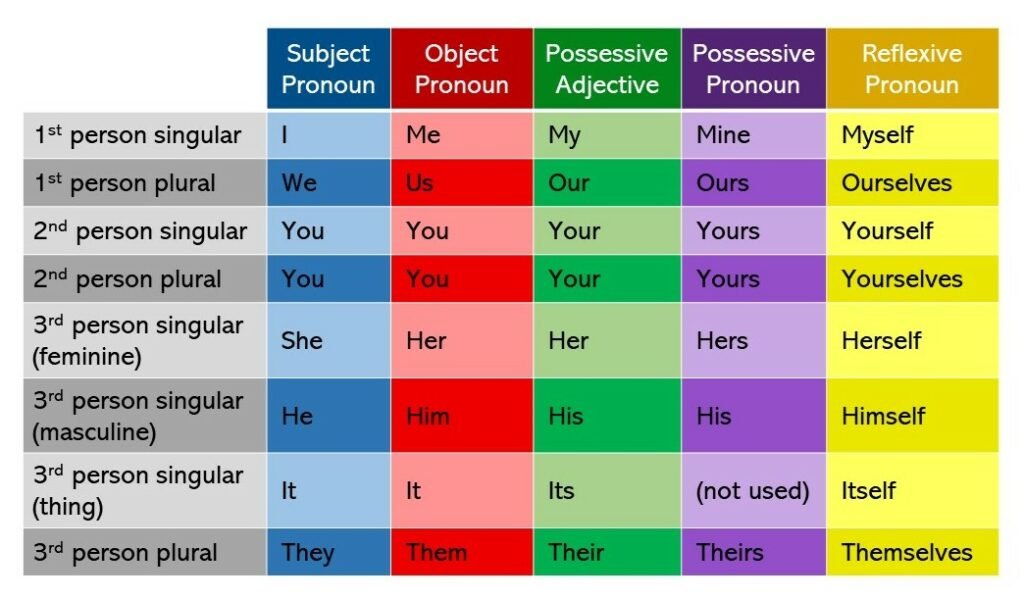Pronoun
It is essential to know about pronouns because we use them in our daily conversation and writing. Pronouns create ease and comfort in our writing. Moreover, they help us in avoiding repetition of nouns.
Definition Of Pronoun
Pronoun is a word which is used in the place of a specific noun. So, pronoun is a word that takes the place of a noun in a sentence.
Examples: I, me, he, she, it, they, you, who, that, someone, myself, yourself, everyone
Types of Pronoun
The term pronoun is not limited. It covers various concepts in English grammar. It may represent a person, an object, a question or a possession. So, pronouns can be divided into different types.
Subject Pronoun
This is the word(pronoun) that works as the subject of the verb in a sentence. A subject pronoun normally replaces the subject(noun) of the previous sentence.
Examples of Subject Pronoun:
Ali will not attend the class. He is bringing food for cattle.
Maria is a storyteller. She told a ghost story to me.

Object Pronoun
It is a pronoun which acts as an object of a verb or preposition. It is also called objective pronoun.
Examples of Object Pronoun:
Me, you, him, her, it, us, them
Alia told them the truth.
Ahmer will give you gift on your birthday.

Possessive Pronoun
Possessive pronoun is a word that replaces a noun or a noun phrase and shows ownership.
Examples of Possessive Pronoun:
Mine, yours, his, hers, ours, theirs
These bags are ours.
That car is mine.

Reflexive Pronoun
A reflexive pronoun is used when something does something to itself.
Examples of Reflexive Pronoun:
Myself, yourself, herself, himself
He was talking to himself.
I baked the bread myself.

Reciprocal Pronoun
A reciprocal pronoun is used to express a mutual action or relationship.
Examples of Reciprocal Pronoun: Each other, one another
The boxers punched each other.

Personal Pronoun
Personal pronouns are words used to represent people or things. They are used to avoid repetition in sentences.
Examples of Personal Pronoun: He, she, it, I, you, we, they
John and Aadi are friends. They play cricket together.
Zeshan knows her very well.

Relative Pronoun
Relative pronouns introduce relative clauses. Without relative pronoun, relative clause would not exist.
A relative pronoun is a type of pronoun that mostly introduces dependent( relative) clauses in sentences. Relative pronoun can stand alone as the subject or object of a sentence.
Examples of Relative Pronoun: Who, whom, whose, whoever, whomever, that( sometimes what,which and where)
Mam Elisa, who taught me grammar, has just got married.
This is the laptop that I bought yesterday.
Sophia is the student whose handwriting is the best in the school.

Indefinite Pronoun
Indefinite pronouns don’t refer to a specific person, place or thing. OR It refers to an unspecified person, place or thing.
Examples of Indefinite Pronoun: Any, all, anyone, anything, each, everybody, everyone, everything, few, many, none, one, nobody, some, several, somebody, someone
Has anybody seen my bag?
You should not tell anyone this secret.
Both men are guilty according to the report.

Intensive/ Emphatic Pronoun
Intensive pronouns emphasize the other noun or pronoun in the sentence. The purpose of intensive pronoun is to put stress on an idea.
Examples of Intensive Pronoun: Myself, herself, himself, itself, ourselves, yourselves
I myself do cooking in holidays.
The Students themselves arranged the trip.

Difference Between Intensive and Reflexive Pronoun
Mostly students get confused while learning intensive and reflexive pronouns. Students should know that intensive pronoun is used to focus on the subject in a sentence. Reflexive pronoun acts as an object of the sentence. Following chart is highly helpful to understand both the pronouns.

Demonstrative Pronoun
Demonstrative pronoun is a pronoun that is used to point to something specific within a sentence. Demonstrative pronouns always identify nouns, whether these nouns are named specifically or not. These pronouns are usually used to describe things, places or animals but they can be used to describe people when the person is known.
Examples of Demonstrative Pronoun: This, that, these, those

Interrogative Pronoun
Interrogative pronouns are used to ask question.
Examples of Interrogative Pronoun: Who, whom, what, which, whose

Chart for Pronouns
Following chart is highly useful for understanding pronouns.

In the end, we hope that all level of students will learn from this article. It provides valuable points about different types of pronouns.



